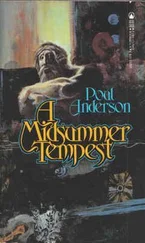Poul Anderson - A Knight of Ghosts and Shadows
Здесь есть возможность читать онлайн «Poul Anderson - A Knight of Ghosts and Shadows» весь текст электронной книги совершенно бесплатно (целиком полную версию без сокращений). В некоторых случаях можно слушать аудио, скачать через торрент в формате fb2 и присутствует краткое содержание. Год выпуска: 1975, ISBN: 1975, Издательство: Roc, Жанр: Космическая фантастика, на английском языке. Описание произведения, (предисловие) а так же отзывы посетителей доступны на портале библиотеки ЛибКат.
- Название:A Knight of Ghosts and Shadows
- Автор:
- Издательство:Roc
- Жанр:
- Год:1975
- ISBN:978-0-451-15057-8
- Рейтинг книги:5 / 5. Голосов: 1
-
Избранное:Добавить в избранное
- Отзывы:
-
Ваша оценка:
- 100
- 1
- 2
- 3
- 4
- 5
A Knight of Ghosts and Shadows: краткое содержание, описание и аннотация
Предлагаем к чтению аннотацию, описание, краткое содержание или предисловие (зависит от того, что написал сам автор книги «A Knight of Ghosts and Shadows»). Если вы не нашли необходимую информацию о книге — напишите в комментариях, мы постараемся отыскать её.
A Knight of Ghosts and Shadows — читать онлайн бесплатно полную книгу (весь текст) целиком
Ниже представлен текст книги, разбитый по страницам. Система сохранения места последней прочитанной страницы, позволяет с удобством читать онлайн бесплатно книгу «A Knight of Ghosts and Shadows», без необходимости каждый раз заново искать на чём Вы остановились. Поставьте закладку, и сможете в любой момент перейти на страницу, на которой закончили чтение.
Интервал:
Закладка:
Flandry’s office, if that was the right name for it, seemed curiously spare amidst the sybaritic arrangements Kossara had observed elsewhere aboard. She wondered what his private quarters were like. But don’t ask. He might take that as an invitation. Seated in front of the desk behind which he was, she made her gaze challenge his.
“I know this will be painful to you,” he said. “You’ve had a few days to rest, though, and we must go through with it. You see, the team that ’probed you appears to have made every imaginable blunder and maybe created a few new ones.” She must have registered her startlement, for he continued, “Do you know how a hypnoprobe works?”
Bitterness rose in her. “Not really,” she said. “We have no such vile thing on Dennitza.”
“I don’t approve either. But sometimes desperation dictates.” Flandry leaned back in his chair, ignited a cigarette, regarded her out of eyes whose changeable gray became the hue of a winter overcast. His tone remained soft: “Let me explain from the ground up. Interrogation is an unavoidable part of police and military work. You can do it on several levels of intensity. First, simple questioning; if possible, questioning different subjects separately and comparing their stories. Next, browbeating of assorted kinds. Then torture, which can be the crude inflicting of pain or something like prolonged sleep deprivation. The trouble with these methods is, they aren’t too dependable. The subject may hold out. He may lie. If he’s had psychosomatic training, he can fool a lie detector; or, if he’s clever, he can tell only a misleading part of the truth. At best, procedures are slow, especially when you have to crosscheck whatever you get against whatever other information you can find.
“So we move on to narcoquiz, drugs that damp the will to resist. Problem here is, first, you often get idiosyncratic reactions or nonreactions. People vary a lot in their body chemistry, especially these days when most of humanity has lived for generations or centuries on worlds that aren’t Terra. And, of course, each nonhuman species is a whole separate bowl of spaghetti. Then, second, your subject may have been immunized against everything you have in your medicine chest. Or he may have been deep-conditioned, in which case no drug we know of will unlock his mind.”
Between the shoulderblades, Kossara’s back hurt from tension. “What about telepathy?” she snapped.
“Often useful but always limited,” Flandry said. “Neural radiations have a low rate of information conveyance. And the receiver has to know the code the sender is using. For instance, if I were a telepath, and you concentrated on thinking in Serbic, I’d be as baffled as if you spoke aloud. Or worse, because individual thought patterns vary tremendously, especially in species like ours which don’t normally employ telepathy. I might learn to read your mind—slowly, awkwardly, incompletely at best—but find that everybody else’s was transmitting gibberish as far as I was concerned. Interspecies telepathy involves still bigger difficulties. And we know tricks for combatting any sort of brain listener. A screen worn on the head will heterodyne the outgoing radiation in a random fashion, make it absolutely undecipherable. Or, again, training, or deep conditioning, can be quite effective.”
He paused. Wariness crossed his mobile countenance. “There are exceptions to everything,” he murmured, “including what I’ve said. Does the name Aycharaych mean anything to you?”
“No,” she answered honestly. “Why?”
“No matter now. Perhaps later.”
“I am a xenologist,” Kossara reminded him. “You’ve told me nothing new.”
“Eh? Sorry. Unpredictable what somebody else does or does not know about the most elementary things, in a universe where facts swarm like gnats. Why, I was thirty years old before I learned what the Empress Theodora used to complain about.”
She stared past his smile. “You were going to describe the hypnoprobe.”
He sobered. “Yes. The final recourse. Direct electronic attack on the brain. On a molecular level, bypassing drugs, conditionings, anything. Except—the subject can have been preconditioned, in his whole organism, to die when this happens. Shock reaction. If the interrogation team is prepared, it can hook him into machines that keep the vital processes going, and so have a fair chance of forcing a response. But his mind won’t survive the damage.”
He ground his cigarette hard against the lip of an ash-taker before letting the stub be removed. “You weren’t in that state, obviously.” His voice roughened. “In fact, you had no drug immunization. Why weren’t you narcoed instead of ’probed? Or were you, to start with?”
“I don’t remember—” Astounded, Kossara exclaimed, “How do you know? About me and drugs, I mean? I didn’t myself!”
“The slave dealer’s catalogue. His medic ran complete cytological analyses. I put the data through a computer. It found you’ve had assorted treatments to resist exotic conditions, but none of the traces a psychimmune would show.”
Flandry shook his head, slowly back and forth. “An overzealous interrogator might order an immediate ’probe, instead of as a last resort,” he said. “But why carry it out in a way that wiped your associated memories? True, such things do happen occasionally. For instance, a particular subject might have a low threshold of tolerance; the power level might then be too high, and disrupt the RNA molecules as they come into play under questioning. As a rule, though, permanent psychological effects—beyond those which bad experiences generally leave—are rare. A competent team will test the subject beforehand and establish the parameters.”
He sighed. “Well, the civil war and aftermath lopped a lot off the top, in my Corps too. Coprolite-brained characters who’d ordinarily have been left in safe routineering assignments were promoted to fill vacancies. Maybe you had the bad luck to encounter a bunch of them.”
“I am not altogether sorry to have forgotten,” Kossara mumbled.
Flandry stroked his mustache. “Ah … you don’t think you’ve suffered harm otherwise?”
“I don’t believe so. I can reason as well as ever. I remember my life in detail till shortly before I left for Diomedes, and I’m quite clear about everything since they put me aboard ship for Terra.”
“Good.” Flandry’s warmth seemed genuine. “There are enough unnecessary horrors around, without a young and beautiful woman getting annulled.”
He rescued me from the slime pit, she thought. He has shown me every kindness and courtesy. Thus far. He admits — his purpose is to preserve the Empire.
“What pieces do you recall, Kossara?” Flandry had not used her first name before.
She strained fingers against each other. Her pulse beat like a trapped bird. No. Don’t bring them back. The fear, the hate, the beloved dead.
“You see,” he went on, “I’m puzzled as to why Dennitza should turn against us. Your Gospodar supported Hans, and was rewarded with authority over his entire sector. Granted, that’s laid a terrible work load on him if he’s conscientious. But it gives him—his people—a major say in the future of their region. A dispute about the defense mechanisms for your home system and its near neighbors … well, that’s only a dispute, isn’t it, which he may still have some hope of winning. Can’t you give me a better reason for him to make trouble? Isn’t a compromise possible?”
“Not with the Imperium!” Kossara said out of upward-leaping rage.
“Between you and me, at least? Intellectually? Won’t you give me your side of the story?”
Читать дальшеИнтервал:
Закладка:
Похожие книги на «A Knight of Ghosts and Shadows»
Представляем Вашему вниманию похожие книги на «A Knight of Ghosts and Shadows» списком для выбора. Мы отобрали схожую по названию и смыслу литературу в надежде предоставить читателям больше вариантов отыскать новые, интересные, ещё непрочитанные произведения.
Обсуждение, отзывы о книге «A Knight of Ghosts and Shadows» и просто собственные мнения читателей. Оставьте ваши комментарии, напишите, что Вы думаете о произведении, его смысле или главных героях. Укажите что конкретно понравилось, а что нет, и почему Вы так считаете.











